The Wave
Meter Mk IV
|
|
Click on the small photo's to get a larger one! |
last update:
2009-06-29 |
| |
|
|
|
|
|
Home |
Comments and/or
questions? Do you want to be notified if there are changes on this page?
Mail to: henk AT vanzwamcs.com |
| |
|
|
|
|
|
|
Recently, I got my hands on something that seemed to be a Wave Meter Mk
IV but turned out to be just the sad remains of such an apparatus. An
almost empty
case and coils, but I bought it because it had a scale plus vernier as
those that were used on our glorious Parasets, including the conversion
scale!
For all of you, I took the slow-motion-drive apart and took photo's. I
even measured it, in inches and millimetres, but I don't have a user
friendly program to put it into a useful drawing. So the drawing will
have to wait. |
|
|
|
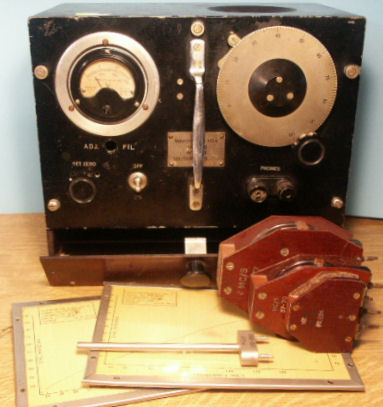 |
Here is the cabinet. On top the socket for the coils. There is a varco
inside that has rotor plates in the shape of a water drop. The cabinet
turned out to be almost empty. The meter had been replaced by a WS-19
meter. I doubted the needle, it had no arrow shaped point. It turned out
that the previous owner had taken apart a WS-19 meter, removed the
interior and replaced it with a plastic meter, probably taken from a
household radio. Bummer! At 10:00 on the main dial you see the
pointer. Further down I will show you a close up.
|
|
|
|
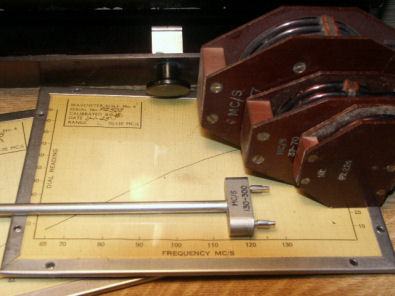 |
Coils and scale in detail. They are stored in a drawer underneath the
Wave Meter.
I think the previous owner intended to convert the Wave Meter into a
much more sensitive grid dipper kind of thing, because he kept the coils
and the varco and got rid of everything else. Look at these scales, they
are double sided. The stamp at the left, top, carries the signature from
the person that calibrated the scale. |
|
|
|
 |
Mmmmm, this box is too small to keep rabbits in. The switch is too
young to be authentic.
Some old wire is left. That, I can use in the Paraset. |
|
|
|
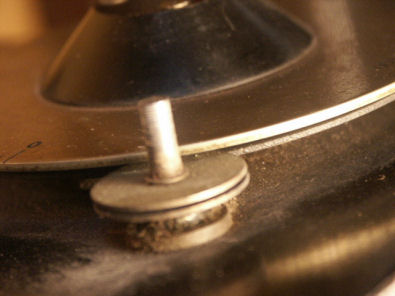 |
Let's look at the bright side. The two platters of the vernier and the
sub-scale are visible. The dirt is authentic WW-II smear. Very rare,
very precious. |
|
|
|
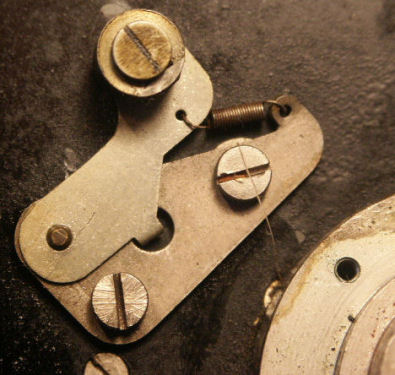 |
This is the close up of the pointer I mentioned before.
The pointer is pulled down by spring action at the side of the scale.
I think it has no further function because the spring tension is not
heavy enough to slow down or secure the dial.
The only thing I can think of, is that if the dial is out of centre,
the pointer can follow the movement of the dial. |
|
|
|
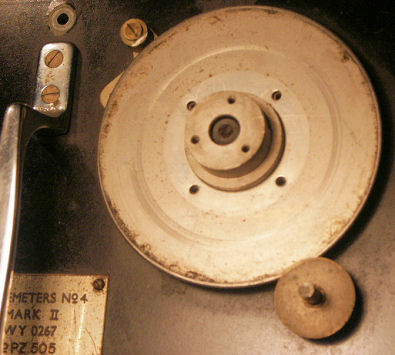 |
Many components were made to make this drive function, yet a decent
scale did not meet the budget. I can't imagine that this handle bar
belongs there. It looks like something, taken from a kitchen drawer. |
|
|
|
 |
This is the bearing for the axle. The hole is off-centre, as you can
see. |
|
|
|
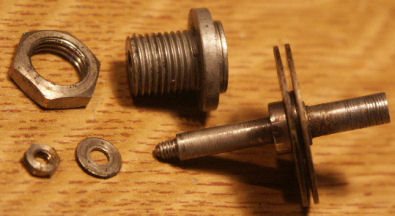 |
The slo-mo-drive in parts. The platters seem to be crimped on the axle
and can't be removed without severe effort. Note: because of the
construction of the axle and platters, and the rim on the bearing, the
distance between dial and front is greater than is in our Parasets. |
|
|
|
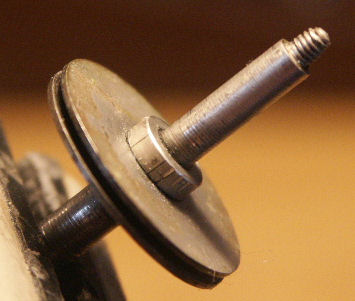 |
The axle in detail. The knob goes on the lower part, which, by the way,
is only 4mm in diameter. |
|
|
|
|
Now, what to do with this wave meter? Don't know yet. Rebuilding is out
off the question. Building a crystal receiver in it? The varco, the
coils and the cards are and belong together....... We'll see in time.
For now, I put it in a dark corner under my workbench. |
|
|
|
|
